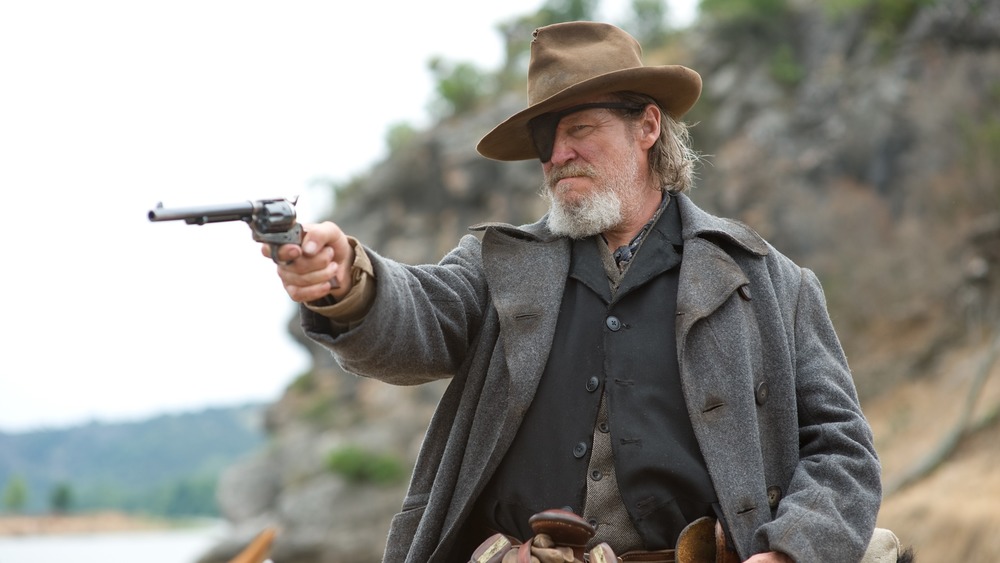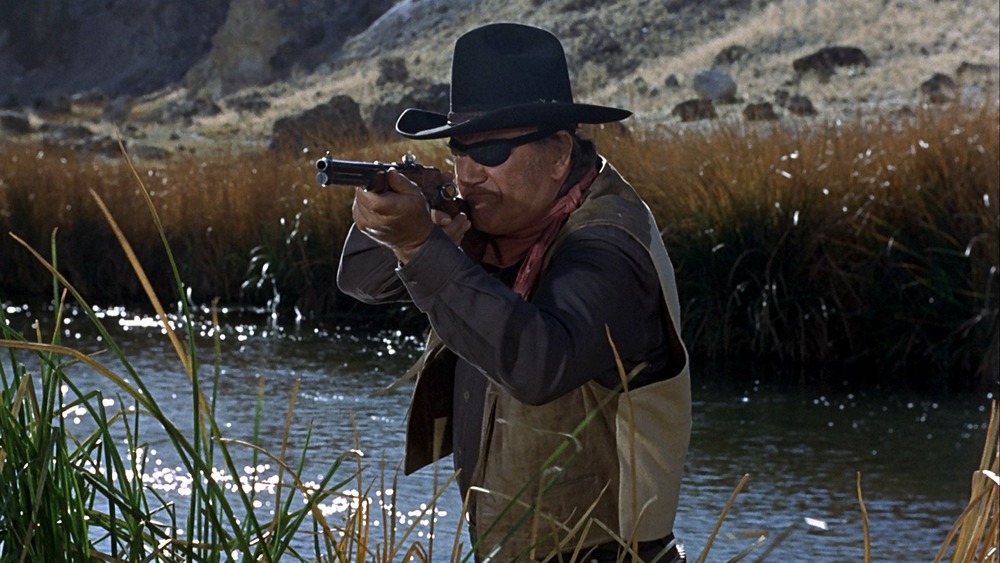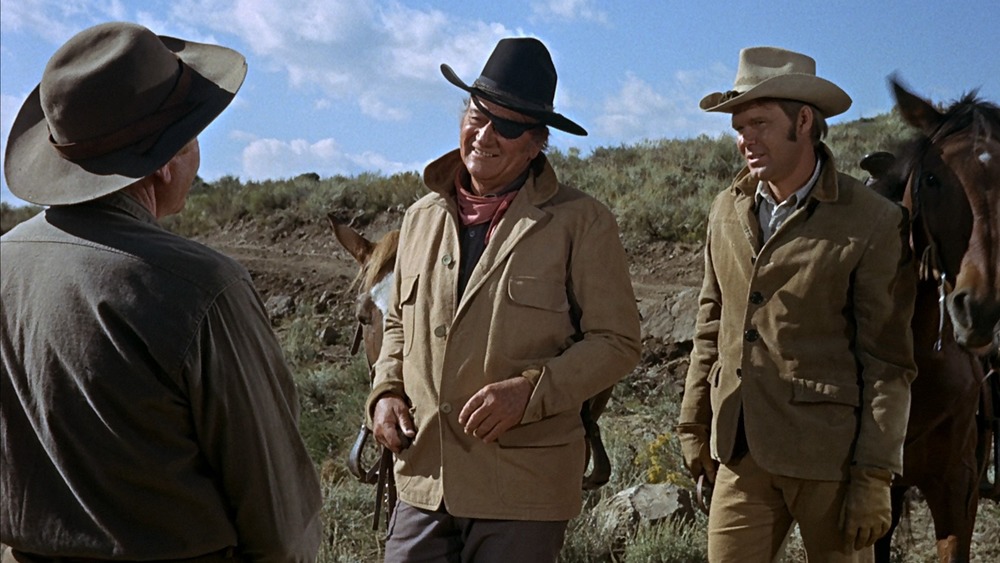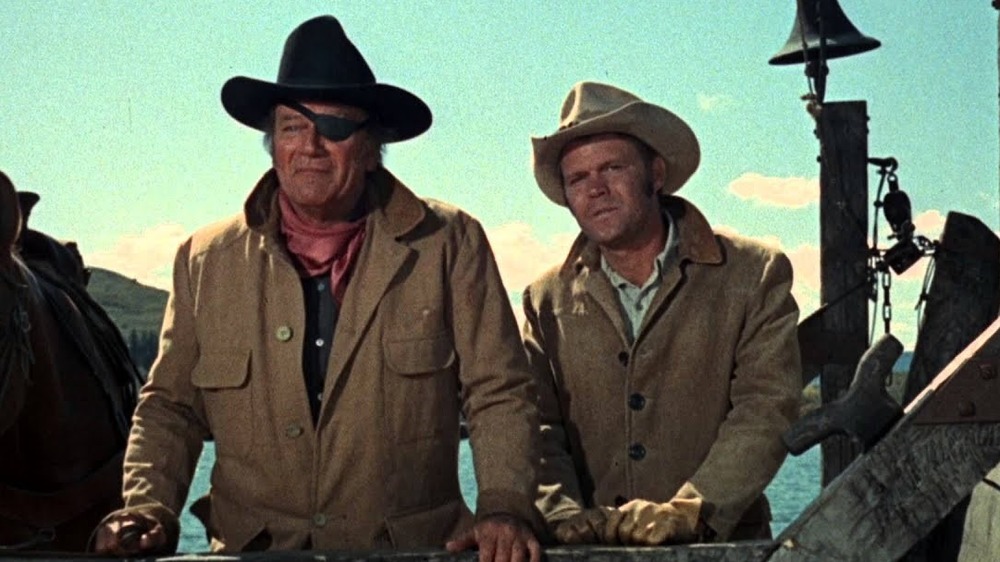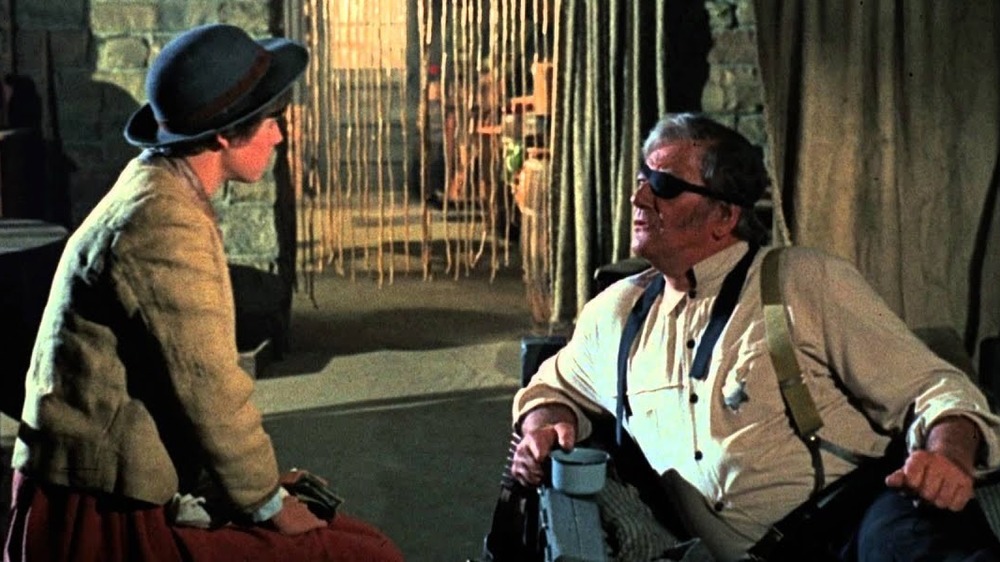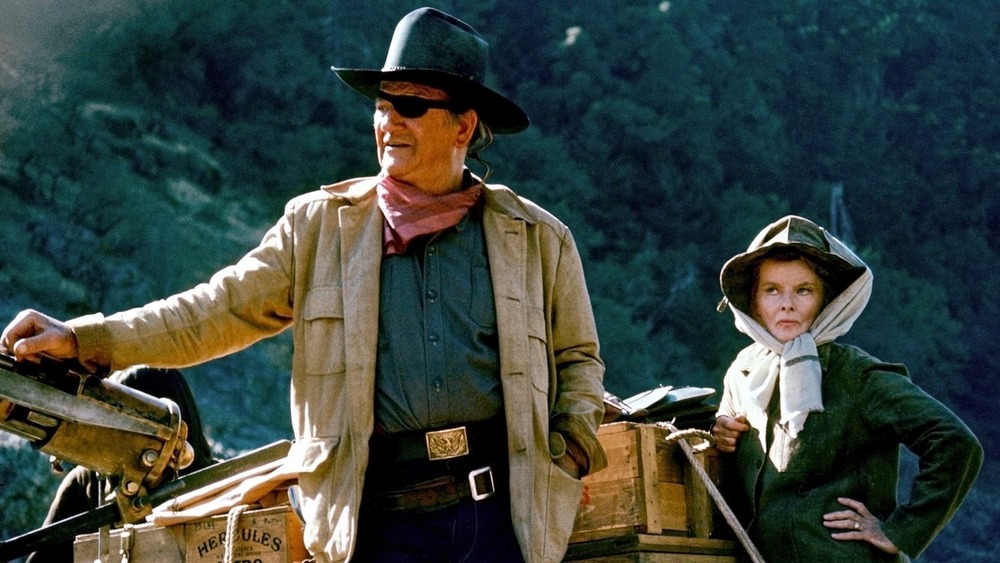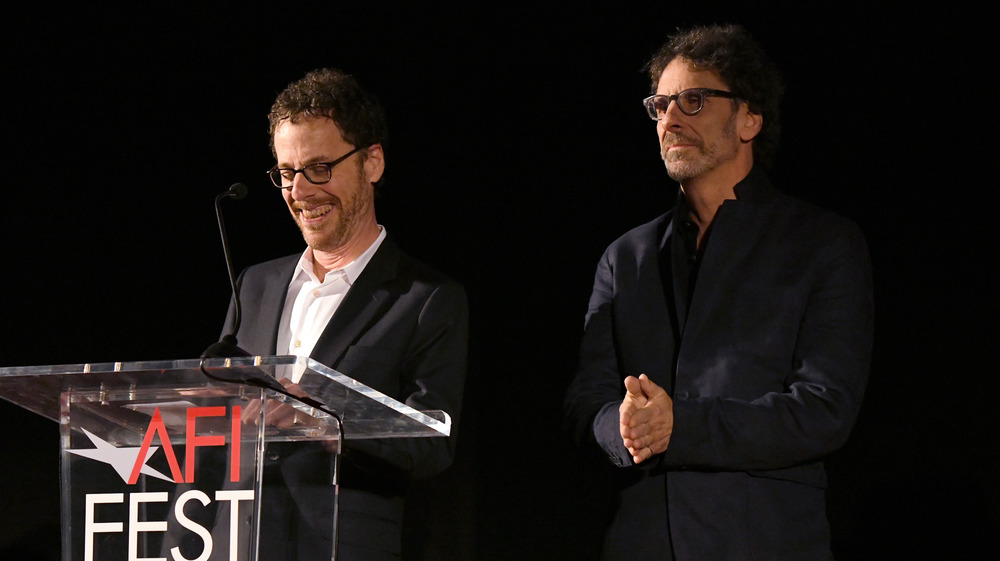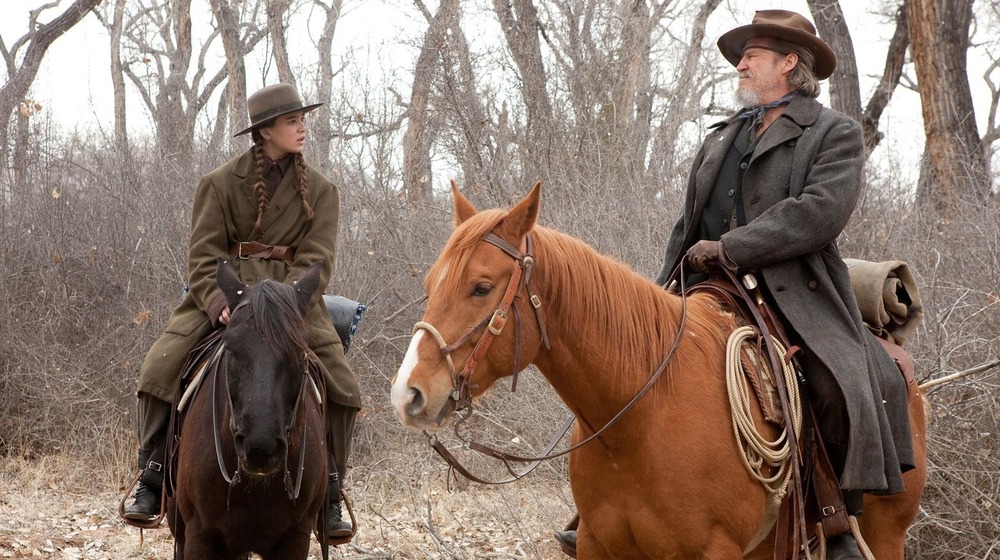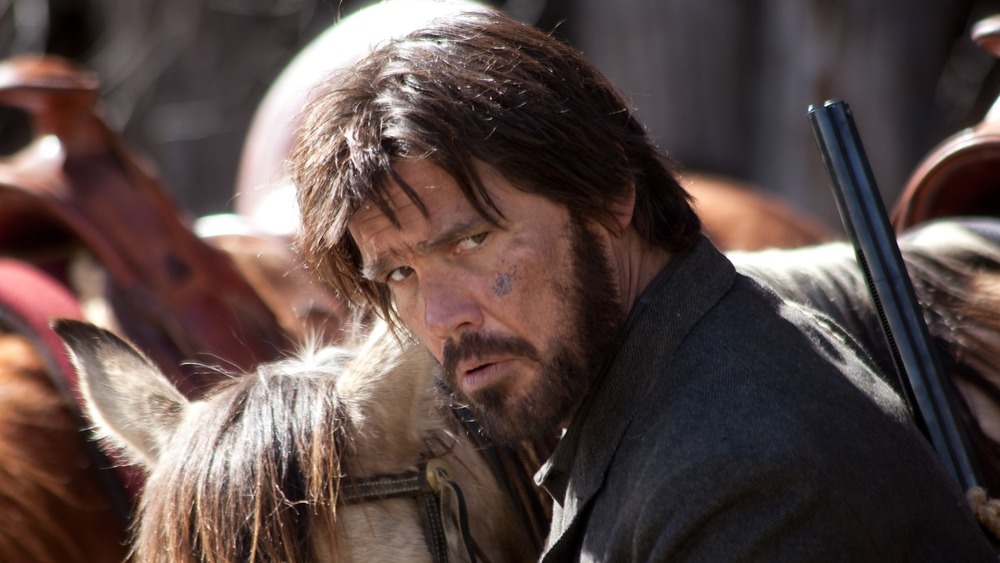The Untold Truth Of True Grit
Adapted twice for the screen, True Grit remains one of the great classic western stories. Yet it is a property that was at odds with the spirit of whatever times it landed in. The original novel written by Charles Portis arrived in 1968, just one year before the first film arrived in theaters. It was far different from the countercultural fiction of the day, which could easily cause people to think Portis was a contemporary of authors like Zane Grey at the turn of the century.
The first film, starring John Wayne as the cantankerous marshal "Rooster" Cogburn, made several sacrifices in tone from Portis' story. Much of the dark humor of the book was tempered and made into more of a traditional western narrative. The 2010 remake from Joel and Ethan Coen moved closer to the novel, but also reckoned with changing attitudes toward how indigenous peoples were treated historically.
What intrigue occurred behind the scenes on both films? Which actors saw their stars rise thanks to being cast? This is the untold truth of True Grit.
Author Charles Portis started out as a journalist
Born in Arkansas in 1933, True Grit author Charles Portis began his writing career as a journalist. His work eventually led him to New York City, where he worked for four years at the New York Herald Tribune, later serving as the London bureau chief for the paper.
Portis' first novel, Norwood, was published in 1966. In it, the writer's skill with conveying Southern deadpan "plainspeak" helped it stand out against the countercultural works of Jack Kerouac, William S. Burroughs, and Allen Ginsberg. That same matter-of-fact narrative style provided True Grit (1968), Portis' second novel, with a distinctive voice cultivated by his journalism years.
The public conversation about True Grit tends to focus narrowly on the film versions, but only the second one by Joel and Ethan Coen attempts to bring Portis' dark sense of humor — best seen in novels like 1979's The Dog In The South – forward. This storytelling is much more akin to authors like Kurt Vonnegut, albeit less anarchic. The Coens would cite Portis' humor — lost for the most part in the 1969 adaptation of True Grit – as a key reason they chose to remake the book into a film.
In all, Portis wrote five novels, including his last, Gringos, published in 1991. He passed away at 86 in February 2020 due to complications from Alzheimer's Disease.
Colorful screenwriter Marguerite Roberts penned the first film version
True Grit screenwriter Marguerite Roberts was a contracted writer for MGM throughout the 1940s. Among her scripts during this period were Ziegfeld Girl, Honky Tonk (both 1941) and Somewhere I'll Find You (1942). She married the writer John Sanford in 1938. A year later, Sanford joined the Communist Party. Roberts joined as well, but left the party in 1947.
In 1946, the trade publication The Hollywood Reporter named the "Hollywood Ten," a group of screenwriters and directors who were cited for contempt of Congress for their refusal to testify regarding their alleged involvement with the Communist Party. These writers were the first to be affected by the "Hollywood blacklist," the practice of not hiring entertainment industry professionals believed to be or to have been Communists or sympathizers. Roberts was blacklisted in 1951 for refusing to answer the House Un-American Activities Committee. She would not be able to write again in a credited capacity until 1960, although she was an uncredited writer on Ivanhoe (1952) and The Girl Who Had Everything (1953). Her credit on the former was restored to her post-blacklisting.
Roberts' skill for writing tough male characters made her a good fit to adapt Charles Portis' novel. "I was weaned on stories about gunfighters and their doings, and I know all the lingo too," she said in an interview. "My grandfather came West as far as Colorado by covered wagon. He was a sheriff in the state's wildest days."
King LaBoeuf?
Among the many efforts to make 1969's True Grit a broad audience-pleasing film was the plan to have Elvis Presley play Texas Ranger LaBoeuf. The choice was three-fold. The production would have the assured star power of The King of Rock and Roll in a key role, returning him to the genre of previous films like Flaming Star and Love Me Tender. They could also get a hit theme song from him which would help market the film. One of True Grit's producers, Hal B. Wallis, was also a producer on Presley's other Paramount Pictures and knew Elvis guaranteed ticket sales.
Ultimately, the producers had to turn him down for the role when his manager, Colonel Tom Parker, demanded top billing over both John Wayne and Kim Darby, the leads of the film. However, the producers still wanted a recognizable name for the part. Country-pop singer Glen Campbell was cast instead, although director Henry Hathaway, known to be a difficult personality, was vocal in his displeasure with Campbell's performance.
The title song by composer Elmer Bernstein and lyricist Don Black, sung by Campbell, received nominations for both the Academy Award for Best Song and the Golden Globe. The film earned an estimated $11.5 million at the United States and Canada box office during its first year of release. Choosing Presley instead might have increased True Grit's cache, but history has proven the choice of Campbell to be a good one.
The original Rooster
John Wayne won a Golden Globe and the Academy Award for Best Actor for his performance of drunken U.S. Marshal "Rooster" Cogburn. Upon accepting his Oscar, Wayne said, "Wow! If I'd known that, I'd have put that patch on 35 years earlier." He would go on to star in a sequel, Rooster Cogburn, alongside Katherine Hepburn. Yet Wayne was not a fan of the first film, nor of the choice of his co-star, Kim Darby. Wayne made several suggestions of his own for who could play Mattie Ross, including singer Karen Carpenter.
Further, Wayne did not get along with Robert Duvall, who played Ned Pepper in the film. Duvall was part of a new generation of method actors, which further ruffled the decidedly old-school Wayne and director Henry Hathaway. A heated conversation between Hathaway and Duvall on how his character should approach a scene provoked Wayne to threaten punching Duvall should he ever argue with the director again.
While promoting the release of the film in 1969, Wayne reportedly told journalists of his overall displeasure, saying he had starred in much better films than True Grit. In 1970, he told actor Richard Burton that he should have won the Best Actor award for his work in Anne of the Thousand Days, where Burton portrayed King Henry VIII.
Rooster got a sequel of his own
True Grit was so well-received that a sequel titled Rooster Cogburn followed in 1975. The film found Wayne reprising his role alongside Katharine Hepburn as elderly spinster Eula Goodnight. The film is often compared not to the original but The African Queen, the 1951 John Huston film, where Hepburn teamed with Humphrey Bogart and had similar onscreen chemistry.
The sequel is not based on any pre-existing material beyond the lead character. The script is credited to Martin Julien, a pen name for Martha Hyer, the wife of producer Hal B. Wallis.
In the film, Cogburn has been stripped of his badge due to his drunken nature, but is given a chance to redeem himself by recovering a shipment of explosives for a U.S. Army troop and capturing the thieves who stole them. Meanwhile, those same outlaws have killed Rev. George Goodnight, whose spinster daughter, played by Hepburn, teams with Cogburn seeking justice for her father's murder — a similar motivation to True Grit's Mattie Ross, who sought revenge for the murder of her father.
Critical response to Rooster Cogburn ranged from lukewarm to outright hostile. Roger Ebert said of the movie, "The dialog...is so consciously arch, so filled with subtle little recognitions of who the two actors are, that we never care about the story and it never gets told. And without a narrative to help us along, we finally have to wonder why the movie was made."
True Grit 2010 and American Revisionism
The 2010 version of True Grit is considered a "Revisionist Western." Directed, written, produced, and edited by Joel & Ethan Coen, the film — also called an "Anti-Western" — seeks to remove aspects of the Western mythos in favor of a more realistic application of history in the story.
The Western has had one of the most difficult transitions into modern media. This is largely due to the depiction of Native Americans, typically used in the past as an interchangeable boogeyman, while the white, male protagonist was virtuous in nearly every way. Older movies and television shows also gloried in bloodless gunplay.
Owing to the Coens' goal of being more faithful to Charles Portis' original book, their True Grit is more violent. Gunfire and knife play have visceral consequences. The great white hope so often illustrated by stoic, chisel-jawed savior-types are replaced by men and women with feet of clay. There is also a pivot to Portis' dark humor, sanded down in favor of traditionalism for the 1969 film. "Rooster" Cogburn in 2010 is a man the 1969 version might have shot dead simply out of disgust. Jeff Bridges does not carry the motion picture history of "Cowboys and Indians" on his shoulders the way John Wayne did, and that allows him the freedom to make his Cogburn a falling-down drunk, a malcontent, as liable to abandon his mission midway than to pursue what will most likely be his own death.
The debut of Hailee Steinfeld
Making her acting debut with True Grit (2010), Hailee Steinfeld made a strong impression right out of the gate. The Coen brothers auditioned more than 15,000 girls via online video submissions and held open casting calls. According to a Hollywood Reporter article from January 2011, they described Mattie Ross as "sassy, fearless, and sure of herself."
"Ninety percent of the kids just get eliminated for one very obvious reason: They're not actors in any sort of natural way," said Joel Coen. "Beyond that, the screenplay, as a reflection of the novel, is written in a very particular kind of language, so it's almost like casting a verse player."
Steinfeld's performance as Mattie Ross earned praise as well as nominations for the Screen Actors Guild Award and Academy Award for Best Supporting Actress. Only 14 years old at the time, the Oscar nomination made Steinfeld the ninth youngest nominee in the category.
Since True Grit, Steinfeld has appeared in the Pitch Perfect film series, the Transformers spin-off Bumblebee, and the Apple TV+ series Dickinson. She is set to join the Marvel Cinematic Universe as Kate Bishop in the upcoming Disney+ series Hawkeye.
Steinfeld has also become a pop star with two successful EPs, Haiz (2015) and Half Written Story (2020), as well as opening slots on tours with Meghan Trainor, Katy Perry, and Charlie Puth. Her song "Back to Life" was released as a single from the Bumblebee soundtrack.
Why the Coens went back to the original book
Joel and Ethan Coen have made a career out of depicting the foibles of peculiar people, from the singing prison escapees in O Brother, Where Art Thou?, to a pair of not-very-bright kidnappers in Raising Arizona, to a stoner bouncing through life in The Big Lebowski. The duo did not need to remake a well-loved classic like 1969's True Grit. However, upon acquainting themselves with the original novel, they realized Charles Portis' tale had far more to it than the original film.
"I reread the book a few years back to my kid out loud and thought it would be fun to do as a movie," Joel Coen said. "(Paramount Pictures) weren't jumping all up and down about it...because I think studios are cautious about 'Westerns,' in quotations marks."
Ethan Coen told the Los Angeles Times, "It's an unusual western story, a novel that's very funny and touching and compelling in many, many different ways. So this wasn't about the [1969] movie." Referencing the studio's antipathy toward the project, he said, "In their minds it's a Western. In our minds, less so."
